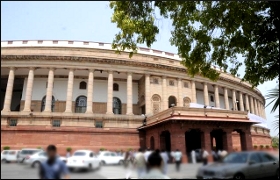|

|
Rajya Sabha passes nine bills in winter session
|
|

|
|
| Top Stories |
 |
|
|
|
SME Times News Bureau | 24 Dec, 2015
Hit by protests throughout the winter session, the Rajya Sabha managed to pass only nine bills during this session that began on November 26, with a bulk going through on Wednesday, the last day of the session.
The bills passed by the Rajya Sabha are:
* The Negotiable Instruments (Amendment) Bill: The bill seeks to amend the Negotiable Instruments Act, 1881. The Act defines promissory notes, cheques and specifies penalties for bouncing of cheques, and other violations.
* The Scheduled Castes and Scheduled Tribes (Prevention of Atrocities) Amendment Bill: The bill amends the Scheduled Castes and the Scheduled Tribes (Prevention of Atrocities) Act, 1989.
The new offences added to the act under the Bill include garlanding with footwear, compelling to dispose or carry human or animal carcasses, or do manual scavenging, abusing SCs or STs by caste name in public, attempting to promote feelings of ill-will against SCs or STs or disrespecting any deceased person held in high esteem, and imposing or threatening a social or economic boycott.
*The Juvenile Justice (Care and Protection of Children) Bill - It provides for the trial of those between 16-18 years as adults for heinous offences. Also, anyone between the age of 16-18 who commits a less serious offence may be tried as an adult if he is apprehended after he attains the age of 21.
* The Commercial Courts, Commercial Division and Commercial Appellate Division of High Courts Bill - It enables the creation of commercial divisions in high courts, and commercial courts at the district level.
* The Arbitration and Conciliation (Amendment) Bill - The bill replaces an ordinance. Under the Act, the relevant court for all arbitration matters would be a principal civil court or high court with original jurisdiction. The ordinance modified this to state that in the case of international arbitration, the relevant court would only be the high court having original ordinary jurisdiction.
* The Atomic Energy (Amendment) Bill - The bill proposes to amend the Atomic Energy Act, 1962. The Act empowers the central government to produce, develop, control, and use atomic energy.
Under the Act, a government company is one in which at least 51 percent of the paid-up share capital is held by the central government.
The bill expands this definition to include companies where the whole of the paid up share capital is held by one or more government company and whose articles of association empower the central government to constitute its Board of Directors. This provision will allow for the formation of joint ventures between Nuclear Power Corporation of India Limited and other government companies.
* The Payment of Bonus (Amendment) Bill - The bill amends the Payment of Bonus Act, 1965. The Act provides for the annual payment of bonus to employees of certain establishments (including factories and establishments employing 20 or more persons). Under the Act, bonus is calculated on the basis of the employee's salary and the profits of the establishment.
* The Appropriation Bills - These are money bills, which the Rajya Sabha returned to the Lok Sabha. The Rajya Sabha has limited power with money bills. Even if it does not return a bill to the lower house, it is deemed as passed by both houses in 14 days.
Apart from these, the house referred The Prevention of Corruption (Amendment) Bill, 2013 to a Select Committee of the Rajya Sabha and the Insolvency and Bankruptcy Code, 2015, was referred to a Joint Select Committee of Parliament.
On Wednesday, government also tried to pass a bill on the sugar cess, but following objections from the members, Deputy Chairman P.J. Kurien decided not to take it up. Presented as a money bill by government, it will be deemed as passed in 14 days.
The winter session concluded on Wednesday.
|
|
|
| |
|
|
|
|
|
|
|
|
|
|
|
|
|
|
| |
| Customs Exchange Rates |
| Currency |
Import |
Export |
US Dollar
|
66.20
|
64.50 |
UK Pound
|
87.50
|
84.65 |
Euro
|
78.25
|
75.65 |
| Japanese
Yen |
58.85 |
56.85 |
| As on 13 Aug, 2022 |
|
|
| Daily Poll |
 |
 |
| PM Modi's recent US visit to redefine India-US bilateral relations |
|
|
|
|
|
| Commented Stories |
 |
|
|
|
|
|
| |
|